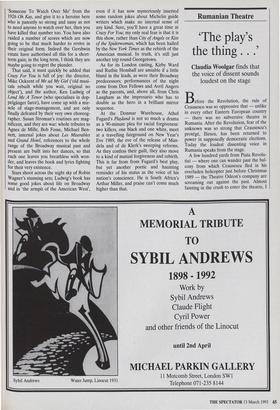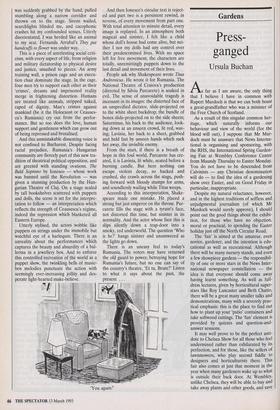Rumanian Theatre
The play's the thing . .
Claudia Woolgar finds that the voice of dissent sounds loudest on the stage Before the Revolution, the rule of Ceausescu was so oppressive that — unlike in every other Eastern European country — there was no subversive theatre in Rumania. After the Revolution, fear of the unknown was so strong that Ceausescu's protege, Iliescu, has been returned to power in supposedly democratic elections. Today the loudest dissenting voice in Rumania speaks from the stage.
A few hundred yards from Piata Revolu- tiei — where one can wander past the bal- cony from which Ceausescu fled in his overladen helicopter just before Christmas 1989 — the Theatre Odeon's company are screaming out against the past. Almost fainting in the crush to enter the theatre, I was suddenly grabbed by the hand, pulled stumbling along a narrow corridor and thrown on to the stage. Sirens wailed, searchlights blinded me, and cacophonic crashes hit my confounded senses. Utterly disorientated, I was herded like an animal to my seat. Fernanda Arrabal's They put handcuffs to flower was under way.
This is a piece of unrelenting social criti- cism, with every aspect of life, from religion and military dictatorship to physical desire and justice, smashed to pieces. An army training wall, a prison cage and an execu- tion chair dominate the stage. In the cage, four men try to support each other as their `crimes', dreams and imprisoned reality merge in frightening distortion. Humans are treated like animals, stripped naked, raped of dignity. Man's crimes against mankind (be it the Holocaust or Ceauses- cu's Rumania) cry out from the perfor- mance. But so too does the love, human support and gentleness which can grow out of being repressed and brutalised.
And this unmistakable dissenting voice is not confined to Bucharest. Despite facing racial prejudice, Rumania's Hungarian community are fiercely part of this new tra- dition of theatrical political opposition, and are greeted with standing ovations. The Bald Soprano by Ionesco — whose work was banned until the Revolution — was given a stunning production by the Hun- garian Theatre of Cluj. On a stage sealed by tall bookshelves scattered with puppets and dolls, the scene is set for the interpre- tation to follow — an interpretation which reflects the strength of Ceausescu's regime, indeed the repression which blanketed all Eastern Europe.
Utterly stylised, the actors wobble like puppets on strings under the immobile but watchful eye of a harlequin. There is an unreality about the performances which captures the beauty and absurdity of a bal- lerina in a jewellery box. And to enforce this controlled recreation of the world as a puppet show, the twinkling bells of music- box melodies punctuate the action with seemingly ever-increasing jollity and des- perate light-hearted make-believe. And then Ionesco's circular text is reject- ed and part two is a persistent rewind, in reverse, of every movement from part one. With total attention to minute detail, every image is replayed. In an atmosphere both magical and sinister, I felt like a child whose doll's house had come alive, but nei- ther I nor my dolls had any control over their predetermined lives. With no space left for free movement, the characters are totally, unremittingly puppets down to the last detail and movement of their lives.
People ask why Shakespeare wrote Titus Andronicus. He wrote it for Rumania. The National Theatre of Craiova's production (directed by Silviu Purcarete) is soaked in evil. The sense of unavoidable tragedy is incessant in its images: the distorted face of an unspecified dictator, slide-projected on to the white sheet backdrop; the bundle of bones slide-projected on to the side sheets; Saturninus, his back to the audience, look- ing down at an unseen crowd, lit red, wav- ing; Lavinia, her back to a sheet, grabbed and held fast by unseen hands which suck her away, the invisible enemy.
From the start, if there is a breath of hope in this foul world, Purcarete has cre- ated, it is Lavinia, lit white, seated before a burning candle. But here nothing can escape violent decay, so hacked and crushed, she crawls across the stage, push- ing forward with bloody stumps for arms, and soundlessly wailing while Titus weeps.
According to this interpretation, Shake- speare made one mistake. He placed a strong but just emperor on the throne. Pur- carete fills the stage with a tyrant's face, not distorted this time, but sinister in its normality. And the actor whose face this is slips silently down a trap-door into a smoky, red underworld. The question 'Who is he?' hangs sinister and unanswered as the lights go down.
There is an uneasy feel to today's Rumania. The voters may have returned the old guard to power, betraying hope for Rumania's future, but no one can say of the country's theatre, `Et tu, Brute?' Listen to what it says about the past, the present . . .
You again!'



























































 Previous page
Previous page